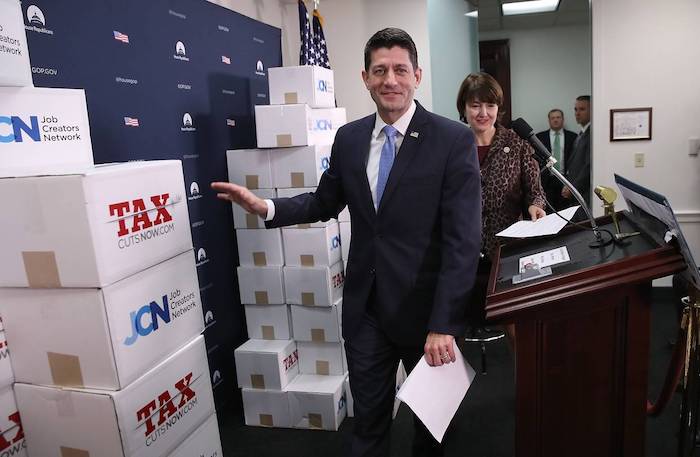
Bill Signals G.O.P. Prioritizes Corporate Tax Cuts
WASHINGTON (TIP): In what appears to be the first major step in the direction of implementation of Trump’s agenda, the House passed a sweeping rewrite of the tax code on Thursday, November 16, by 227-205. The Bill seeks to enact $1.5 trillion in tax cuts for businesses and individuals and deliver the first major legislative achievement of President Trump’s tenure.
The House tax bill, which passed in the Ways and Means Committee last week, would cut taxes more than $1.4 trillion over 10 years. It cuts the corporate tax rate to 20 percent from 35 percent, collapses the number of tax brackets to four from seven, switches the United States to an international tax system that is more in line with the rest of the world, and eliminates or scales back many popular deductions, including one for state and local taxes paid.
The House easily passed its tax bill, with lawmakers voting shortly after Mr. Trump came to Capitol Hill to address House Republicans. Representatives voted along party lines, except for 13 Republicans, many of whom fought to keep the deduction for state and local taxes. The Republicans who voted no were from New York, New Jersey, California and North Carolina. Zero Democrats voted for it.
Attention now turns to the Senate, which was grappling on Thursday with another setback after a congressional analysis found that their revised tax bill would actually raise taxes on lower-income Americans within a few years.
The Joint Committee on Taxation projected that Americans earning $30,000 or less would see their taxes increase beginning in 2021, if the Senate bill becomes law. The committee also projected that Americans earning $75,000 or less would face large tax increases in 2027, after the individual tax cuts expire. The updated analysis stems from the Senate’s last-minute inclusion of a provision that would repeal the Affordable Care Act’s requirement that most people buy health insurance. The repeal would lead many lower-income Americans to choose not to buy insurance, and thus not claim tax subsidies that currently help them defray the costs of health coverage.
The tax overhaul still faces significant obstacles, as Republicans must align the House legislation with the bill that is working its way through the Senate Finance Committee this week and contains big differences that will have to be bridged.
Republicans are under pressure to get legislation to Mr. Trump’s desk by Christmas, especially after failing in their attempt to dismantle the Affordable Care Act this year, even though their party has full control of government. Lawmakers also want to push the legislation through quickly to avoid giving lobbyists and Democrats time to mobilize.
Republicans do not wish to witness a replay of their health care catastrophe, during which the House managed to pass a repeal bill in May, but the narrowly divided Senate could never do so.
“For the first time in 31 years we are wiping the tax code clean and replacing it with one that is fairer and simpler for everyone,” said Representative Devin Nunes, Republican of California and a member of the Ways and Means Committee.
House Republican leaders were unable to win over a number of Republicans from high-tax states like New York and New Jersey, who have fought to preserve the deduction for state and local taxes. The House bill allows the deduction of up to $10,000 in property taxes, but that provision was not enough of a concession for them.
At least five Republicans from New York and three from New Jersey had come out against the bill before Thursday’s vote.
“I just have too many constituents who are going to see their taxes go up,” said Representative Lee Zeldin, who represents a district on Long Island and was one of several New York Republicans who spoke out against the tax bill on Thursday morning. “You’re taking more money from a place like New York in order to pay for deeper tax cuts elsewhere,” Mr. Zeldin said.
Congresswoman Lucille Roybal-Allard (CA-40) said: “The fact is, this bill is so skewed to benefit the wealthiest 1% in America that it could more accurately be named ‘H.R. 1%.”
Congressman’s statement further said, “On behalf of America’s future generations who will be saddled with an unsurmountable debt created by H.R. 1, the Republican tax plan, I strongly opposed this bill. This rushed piece of legislation will not only add more than $1.7 trillion to the national debt over the next 10 years, but it will also shift the burden of paying for that debt to our hardworking families.
“Despite our Republican colleagues’ assertions that this tax plan will benefit the majority of Americans, numerous economists disagree. They note that nearly 45% of all households with children will see a tax increase, while 80% of our wealthiest citizens will receive a tax cut by 2027.
“Even more egregious, this tax bill seeks to eliminate the long-standing state and local tax deduction, subjecting every wage earner’s income to double taxation. This defeats the original framers’ intent to avoid a system of double taxation. The original tax code, drafted in 1913, consisted of three pages in its entirety and included the state and local tax deduction at the core of its responsible tax policy to ensure state and local governments could raise revenues for public schools, police, fire, and emergency services.
“Plain and simple, this tax plan is a tremendous windfall for our wealthiest 1% and large corporations. It favors large businesses over small businesses, it favors sending jobs overseas rather than creating jobs at home, it favors the wealthy over hourly wage earners, and it pays for these tax cuts for the wealthy by raising taxes on our middle class families to the detriment of Medicare, Medicaid, education, and other vital public services.
“The fact is, this bill is so skewed to benefit the wealthiest 1% in America that it could more accurately be named ‘H.R. 1%.’ In the name of the other 99% of Americans, I voted against H.R. 1.”





Be the first to comment